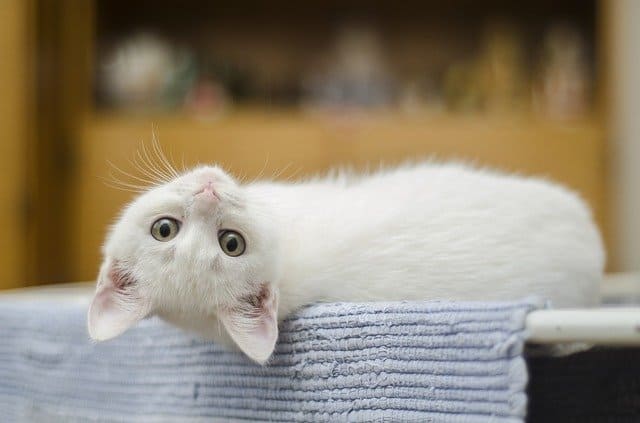What do you do if you note your cat shaking its head? A cat shaking its head is not a common occurrence. If it happens to yours, then there might be a minor or significant problem behind it. In most cases, this behavior is caused by something minor. You do not have to panic.
Pet experts and vets will tell you that the head-shaking can mean a few things. On one hand, it can signify an infection, especially in the ear. On the other hand, it can be infestation by mites or any other irritation.

Try to determine what is causing the head shaking. If you cannot identify the cause, let your vet ascertain why this is happening. With proper diagnoses, the vet will recommend remedies or medications that may deal with this problem.
Contents
Reasons for cat shaking head
Your cat will not just shake its head for no reason. Also, this will come along with other symptoms such ear discharge, wax build-up, bleeding and itching among others. All of these symptoms mean different things.
Commonly, feline shaking its head is attributed to the following factors:
Ear infections
If your cat is having an ear infection, then you expect it to frequently shake its head. Although these infections are not so common when they occur they can give your cat a terrible time.
Ear infections can target the outer external ear including the ear canal. Newportharborvets.com identifies that most of these infections are attributed to yeast and bacterial infections.
When the infection targets the outer ear, it is known as otitis externa. Infections in the outer ear are never that serious. They are mainly attributed to mite’s infestation, bacteria, and yeast. However, the infection gets critical as it gets deeper.
Symptoms of ear infections
Apart from head shaking, be keen to note other symptoms that signify an ear infection. Below are some common symptoms that will accompany this infection.
- Yellow or black discharge
- The ear becomes red and swollen
- A strong smell emanating from the ear
- Hearing loss
- Disorientation and even difficulty walking
- Wax building up, especially in the canal
Causes
Many cat owners do not understand where such infections come from. Understanding the causes is essential in preventing such infections. According to pets.webmd.com, their common causes include:
- Bacteria or yeast infection
- Allergic reaction to some allergens
- A disease the suppresses the feline’s immunity
- Buildup of wax
- Unhygienic ears
- Growth of thick hairs inside the ear
- Diabetes mellitus
- Exposure to some harmful foreign bodies such as grass or dust
All these factors result to an ear infection characterized with frequent head shaking. The vet, after diagnosing the cause, may recommend various treatments depending on the cause i.e. antifungals, antibiotics, and so on. Moreover, the vet may thoroughly clean the ear canal, especially if there is a mass accumulation of wax and dust particles.
Ear mites
Ear mites in cats can cause two things: an infection and discomfort. Either of these will cause your feline to shake its head. These parasites can be caught from other cats or even dogs. Once on your pet’s ear, these parasites feed on wax and skin.
Note that most of these mites are microscopic. The mites cause severe itching. As the cat tries to scratch the itching, it shakes its head.
Symptoms of mites
Some of the common symptoms include:
- Head shaking
- Inflammation in the inner ear
- Rubbing of ears to scratch the itching
- Strong odor
- Hair loss around the ears
- Discharge that may obstruct the ear canal
- Scabs in the skin around the ear
These come along with many complications. Apart from infections, the cat may rupture blood vessels in the ear in the process of scratching. The condition is known as hematoma.
Treatments
If the vet diagnoses mites as the cause of head shaking, then he can recommend some of the following treatment options:
- Anti-mites’ creams, lotions, and medicated ear drops: Otomite Plus Ear Mite Treatment or Four Paws Ear Mite Remedy while products and cleansers like Petpost Pet Ear Cleaner Wipes for Dogs and Cats, Pet MD Otic Clean Dog Ear Cleaner for Cats and Dogs, among others will help prevent infections and deal with these mites.
- Injectable antibiotics
- Cleaning the ear to remove debris and wax
In a matter of days after treatment, your cat will be fine.
Oral problems
Any issue in your cat’s mouth can make it shake its head. It can have teeth and gum complications.
Causes
Some of the common dental problems in cats include:
- Periodontal disease - caused by a buildup of tartar and plaque in your feline’s mouth.
- Cancer - Especially in the cat’s lips, jawbone, gums, tongue or even plate.
- Stomatitis - caused by severe inflammation of tissues lining the oral cavity.
- Tooth Resorption - Occurs when the body starts resorbing the dentin, thus the teeth getting loose
- Fractures - These mainly affect the teeth, especially the canine and premolars
- Abscessed tooth
If this pet is having oral problems, you will note frequent head shaking due to discomfort. Other symptoms that are associated with oral problems include:
- Drooling
- Loss of appetite
- Bad breath
- Neglected grooming
- Difficulty eating
- Pawing at the mouth
- Oversensitive jaw and mouth area
In case of these symptoms, alongside head shaking, please visit a vet. He will diagnose the problem and recommend the right treatment.
Feline infectious peritonitis
This a condition caused by the feline coronavirus. The virus causes severe gastrointestinal infections. In kittens, feline peritonitis is characterized by head shaking and diarrhea. Feline coronavirus is passed out of the cat’s body through feces. This means that the virus can be passed from one kitten to the other.
Symptoms
When cats ingest or inhale the virus, they become infected. Some of the common symptoms of feline coronavirus include:
- Loss of appetite
- Weight loss
- Diarrhea
- Frequent head shaking due to discomfort
- Fever
Treatments
If the doctor diagnoses your feline friend with this condition, he may recommend some of the following treatment and prevention options:
- Antiviral drugs- Such as feline recombinant interferon omega
- Immune boosters- such as polyprenyl immunostimulant
- Vaccination
- Prevention of FCoV, especially among kittens
This viral infection is very complex, thus making it tricky to treat. However, the above treatment options may provide significant relief.
Devon Rex myopathy
This condition is associated with defects in the cat’s nervous system. In this context, signals from the nerves cannot be transmitted to the muscles. As a result, there is general muscle weakness and frequent head shaking in cats.
Some of the common symptoms of Devon Rex Myopathy include:
- Cat shaking its head
- Inability to walk
- Inability to swallow
- General body weakness
- Chocking
This condition is genetic and is passed on from mothers to kittens. The vet should conduct a DNA assessment to assess the carriers of this disease. The bad thing is: this condition is incurable. In the long run, the infected cats end up dying.
Article Citations and References
- Newportharborvets.com Why is My Cat Shaking His Head?
- Cat-world.com Head Shaking in Cats – Causes, Diagnosis, and Treatment
- Pets.webmd.com Ear Infections in Cats: Causes, Treatment, and Prevention





James R Laney
Does no one understand that cats are shaking their heads in a negative response? Every cat that I've had in the past decade has had the ability to respond to a number of simple questions as a quick shake of the head as no thanks, e.g. ME; Showing a briefly open door exclaiming "want to come in" CAT; Brief shake of the head as a negative response.
My girlfriend and I can't be the only ones to recognized this!
So my question; Is this the first you've heard of this? Thank you for your response.
Hausns
I’m with you on this one cats say no... or they are mildly disturbed